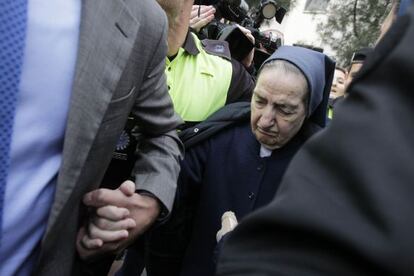Sisters of Charity nun María dies at 88
Former clinic worker at center of missing children scandal takes her secrets to the grave


María Gómez Valbuena, the only official suspect in the investigation into two open cases of stolen babies, has died. She was 88.
Sister María was called to testify in court last Friday in a suit brought by Purificación Betegón, who claims that her twins were stolen from her at the Santa Cristina clinic in Madrid in 1981. The nun's lawyer, José María Calero, presented a medical report to the investigating judge excusing his client from the obligation to attend. Among the reasons stated on the report was a cardiorespiratory problem.
According to the Sisters of Charity convent where Gómez Valbuena lived, she passed away "a few days ago." Calero will submit the death certificate by Monday. Sister María's passing will result in the ongoing cases being shelved, judicial sources said.
Sister María takes with her the final opportunity of Betegón discovering the whereabouts of her children. “I hope God forgives her, because I never will,” she said last Friday.
On April 12, 2012, Sister María was called to appear in court as a suspect in another case, the alleged kidnapping of a girl born in the Santa Cristina clinic in 1982. The nun took refuge in her right to silence on that occasion but released a statement to the media in which she denied any knowledge of the events. However, her name is repeated often among mothers who suspect their babies had been put up for adoption to wealthy families unable to conceive. For many years their suspicions were not taken seriously.
She was spinning a web until she had me trapped”
María Luisa Torres, who filed the first lawsuit against Sister María, said the nun was a Jekyll and Hyde figure. “I was very scared and she comforted me. I trusted her. She was spinning a web until she had me trapped.”
It was 1982 and Torres was pregnant, separated and alone. She went to Sister María after seeing an advertisement in which the nun offered to help mothers in dire straits. “When I woke up after giving birth, she was a different person. She had two faces; she was cruel, haughty. She kept my baby. She threatened to take my other daughter, for adultery. And while she was saying it, I could see her imagining that moment.”
Sister María also worked at the San Ramón clinic, managed by Doctor Eduardo Vela, another name that crops up regularly in stolen baby cases. The nun was in demand. Couples from across Spain would come to her when they had exhausted the traditional avenues. Young hard-up single mothers like Torres, servant girls, or daughters who had been thrown out of the family home after breaking the news formed her pool of donators.
Some of the parents who adopted these children kept invoices generated by Sister María for the girls’ upkeep and treatments. Alejandro Alcalde, who adopted María Luisa Torres’ daughter, Pilar, was charged for “birthing costs, anesthesia...”
Many of these couples were sent to Sister María by the Spanish Adoption Protection Agency, founded in 1969 by then-Supreme Court Justice Gregorio Guijarro.
In 1980, he told EL PAÍS: “Today, the quickest way to adopt a child is to win the friendship of the people directly involved. Social workers, nuns... in terms of children to adopt, a good file is in the hands of Sister María Gómez Valbuena.”
Tu suscripción se está usando en otro dispositivo
¿Quieres añadir otro usuario a tu suscripción?
Si continúas leyendo en este dispositivo, no se podrá leer en el otro.
FlechaTu suscripción se está usando en otro dispositivo y solo puedes acceder a EL PAÍS desde un dispositivo a la vez.
Si quieres compartir tu cuenta, cambia tu suscripción a la modalidad Premium, así podrás añadir otro usuario. Cada uno accederá con su propia cuenta de email, lo que os permitirá personalizar vuestra experiencia en EL PAÍS.
¿Tienes una suscripción de empresa? Accede aquí para contratar más cuentas.
En el caso de no saber quién está usando tu cuenta, te recomendamos cambiar tu contraseña aquí.
Si decides continuar compartiendo tu cuenta, este mensaje se mostrará en tu dispositivo y en el de la otra persona que está usando tu cuenta de forma indefinida, afectando a tu experiencia de lectura. Puedes consultar aquí los términos y condiciones de la suscripción digital.








































